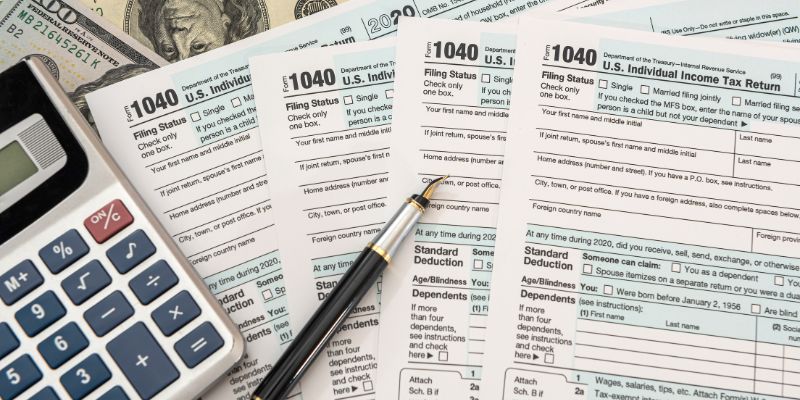Is Bankruptcy a Solution to Back Taxes?
Is Bankruptcy a Solution to Back Taxes?
Dealing with a pile of unpaid taxes can be daunting and distressing. Many individuals wonder if filing for bankruptcy is a viable solution to their tax troubles. The answer is that it can help, but there are specific requirements that must be met for it to be beneficial. In this blog, we will discuss the advantages and disadvantages of declaring bankruptcy, the process of discharging back taxes, and the importance of having tax return salt lake city by your side throughout this process.
What Actually Complexity of Backtaxes Depicts?
Back taxes are any unpaid tax liabilities from a previous tax period. These unpaid taxes can result in significant penalties, interest, and even legal action from the IRS. If you owe back taxes, help is available, but identifying your choices can be the first step toward settlement. Seeking competent counsel from Salt Lake City tax attorneys will offer you a clear road map for addressing your tax concerns successfully.

A Possible Resolution: Bankruptcy
Although there are strict guidelines and restrictions, declaring bankruptcy may be a useful strategy to get rid of some debts, including some back taxes. In order to contemplate filing for bankruptcy to discharge past taxes, the IRS requires that five important requirements be satisfied. If these requirements are not met, your tax bill and any related penalties will remain unpaid, putting you back in the starting line. Here’s an in-depth look at these crucial conditions:
Eligibility Is Limited To Income Taxes
- Only Income Taxes
In bankruptcy, only income taxes are dischargeable. Well, certain types of tax liabilities, such as trust fund taxes, payroll taxes, fraud penalties, and recent property taxes, are not dischargeable. To determine which tax bills might be eligible for discharge, consult Salt Lake City tax lawyers for assistance.
- Tax Debt Must Be At Least Three Years Old
Back taxes older than three years are the only ones eligible for consideration by the IRS for discharge. This rule aims to prevent abuse of the bankruptcy process. You can confirm if your tax debt meets this criterion by consulting with Salt Lake City tax lawyers.
- No Attempts at Deception or Avoidance
To qualify for tax discharge through bankruptcy, you must demonstrate that you have not attempted tax evasion or fraud. It is crucial to maintain honest and transparent tax transactions. Seek assistance from Salt Lake City tax attorneys to gather the required documentation and evidence.
- Filed Tax Returns
Before filing for bankruptcy, it’s important to file tax returns for the relevant tax years at least two years prior. This is necessary for any tax debt to be discharged. If you have an outstanding balance and haven’t filed a return during this period, the IRS will not consider your debt for discharge. Salt Lake City tax experts can assist with filing required returns and preparing paperwork for your bankruptcy case.
- Passing the “240-Day” rule
To qualify for bankruptcy relief, the IRS must have assessed the tax liability at least 240 days before filing, or it may qualify if it has not been assessed at all. This means the tax obligation must have been accumulated for a considerable amount of time. Salt Lake City tax attorneys can assist in reviewing the assessment dates to determine if they satisfy the 240-day limit.
Why Bankruptcy Might Be Right for You
Bankruptcy can be a powerful element for addressing IRS back taxes owed if you meet all the specified conditions. Here’s why it might be the right solution for you:
- Significant Tax Debt: If you have a substantial amount of old tax debt that meets the discharge criteria, bankruptcy can offer a fresh start. It wipes out qualifying debts, allowing you to rebuild your financial life.
- Other Debts: If you are also dealing with other important debts, including credit cards or medical bills, bankruptcy can help you eliminate or restructure these liabilities alongside your tax debt. This comprehensive approach can be particularly effective for managing overall financial health.
- Limited Assets: If you do not have sufficient assets to cover your tax liabilities, bankruptcy might be the most viable option to relieve your financial burden. It protects your essential assets while addressing your outstanding debts.
To make this choice, though, you should think it through carefully and seek expert guidance. Professionals can help you understand the potential consequences and benefits of filing for bankruptcy and assist you in making an informed decision.

Alternative Solutions to Consider
Before deciding on bankruptcy, it’s essential to explore other potential solutions for managing your tax debt:
- Installment Agreements: The IRS offers payment plans that allow you to pay your tax debt in manageable instalments over time. This option can spread out the financial burden, making it easier to handle.
- Offer in Compromise: If you can show that paying the entire amount due would put you in a difficult financial situation, you can utilize this program to settle your tax obligation for less than what is owed. This can be a favourable option if your financial situation is dire.
- Currently Not Collectible Status: If you’re unable to pay due to financial difficulties, the IRS might temporarily halt collection activities. This provides breathing room to improve your financial situation without the constant pressure of IRS collections.
- Penalty Abatement: You may request a reduction or elimination of penalties if you have a valid reason for not paying your taxes on time. This can significantly reduce the overall amount owed and make it easier to resolve your tax issues.
The Impact of Bankruptcy on Your Financial Future
While bankruptcy can provide significant relief from IRS back taxes owed, it’s important to understand the long-term impact on your credit. For ten years, bankruptcy may remain on your credit report, making it more challenging for you to obtain credit, find housing, or, in some cases, even find employment. However, if you’re already struggling with overwhelming debt, the potential benefits of bankruptcy might outweigh the drawbacks, offering you a chance to rebuild your financial life. It provides a clean slate and an opportunity to develop healthier financial habits.
Conclusion
Bankruptcy can indeed be a solution for addressing IRS back taxes owed, but it’s not a one-size-fits-all answer. It requires meeting specific criteria and careful consideration of your overall financial situation. If you owe back taxes, help is available through experienced tax professionals.
You can contact the team at the Tax Law Center for a consultation. We can help you make the right decision and assist you in achieving the financial relief you need. With their support, you can find the most effective solution to your tax problems and move towards a more stable financial future.
